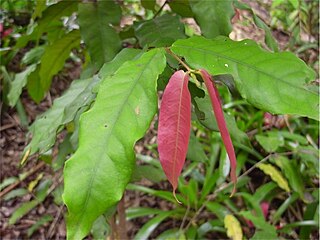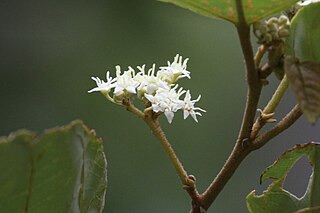
Austrobaileya is the sole genus consisting of a single species that constitutes the entire flowering plant family Austrobaileyaceae. The species Austrobaileya scandens grows naturally only in the Wet Tropics rainforests of northeastern Queensland, Australia.

Sankowskya is a genus of plants. The sole known species, Sankowskya stipularis, is a tree endemic to one locality in the Wet Tropics rainforests of northeastern Queensland, Australia. The species constitutes part of the plant family Picrodendraceae. Few botanical collections have ever been made of the trees, from a very restricted area of the Wet Tropics rainforests, hence the species has obtained the conservation status of "endangered" in the legislative regulation of the Queensland Government's Nature Conservation Act 1992. Notably, trees grow naturally in the Thylogale Nature Refuge.

Cupaniopsis is a genus of about 67 species of trees and shrubs of the soapberry family, Sapindaceae. They grow naturally in New Guinea, New Caledonia, Australia, Torres Strait Islands, Fiji, Samoa, Sulawesi, Micronesia. Many species have been threatened with extinction globally or nationally, with official recognition by the International Union for Conservation of Nature (IUCN) and several national and state governments.
Eucryphia jinksii, the Springbrook leatherwood, is a species of rare rainforest trees found in Queensland and New South Wales, Australia, of the plant family Cunoniaceae.

Argophyllum is a genus in the Argophyllaceae family comprising eighteen species of shrubs and small trees. They feature alternate, simple leaves, often silvery white underneath. They appear in Australia and New Caledonia, where several species are nickel hyperaccumulators.

Mischarytera is a genus of rainforest trees, constituting part of the plant family Sapindaceae. Four species are known to science as of December 2013, found growing naturally in eastern Queensland, Australia, and in New Guinea. Formerly until 1995, they had names within the genus Arytera, subgenus Mischarytera.

Synima is a genus of tropical rainforest trees, constituting part of the plant family Sapindaceae.
Leptospermum pallidum is a species of spreading shrub that is endemic to Queensland. It has thin, firm, rough bark, narrow lance-shaped leaves, white flowers arranged in groups of two or three on side shoots and fruit that remains on the plant until it dies.

Phebalium longifolium is a species of shrub that is endemic to far north Queensland. It is more or less covered with silvery to rust-coloured scales and has smooth branchlets, narrow elliptical to narrow lance-shaped leaves and cream-coloured flowers in umbels on the ends of branchlets. It grows in the boundary between forest and rainforest in tropical areas.

Argophyllum curtum is a plant in the Argophyllaceae family endemic to a small part of north eastern Queensland. It was described and named in 2018.

Argophyllum palumense is a plant in the Argophyllaceae family endemic to a small part of north eastern Queensland. It was described and named in 2018.
Argophyllum loxotrichum is a plant in the Argophyllaceae family endemic to a small part of north eastern Queensland. It was described and named in 2018.

Dendrocnide cordifolia, commonly known as the stinging tree, is a plant in the nettle family Urticaceae endemic to the Atherton Tablelands, south west of Cairns, Queensland. Contact with the plant results in a painful sting, however the intensity and duration of the pain from this plant is extreme.
Argophyllum lejourdanii is a plant in the Argophyllaceae family endemic to a part of north eastern Queensland, Australia. It was described and named in 1863.
Argophyllum heterodontum is a plant in the Argophyllaceae family endemic to a small part of north eastern Queensland. It was described and named in 2018.
Argophyllum iridescens is a plant in the Argophyllaceae family endemic to a small part of north eastern Queensland. It was described and named in 2018.

Pittosporum ferrugineum, commonly known as the rusty pittosporum or rusty-leaved pittosporum, is an evergreen plant in the family Pittosporaceae native to Malesia, Papuasia, the Northern Territory and Queensland.

Commersonia macrostipulata is a species of flowering plant in the family Malvaceae and is endemic to Queensland. It is a shrub or tree with egg-shaped leaves that are slightly serrated on the edges, flowers with five cream-coloured to white sepals and bristly fruit.

Rubus queenslandicus, commonly known as bramble-of-the-cape, rose-leaf bramble, or native raspberry, is a plant in the family Rosaceae which is endemic to a small part of the rainforests of northeastern Queensland, Australia.

Argophyllum cryptophlebum is a plant in the Argophyllaceae family endemic to a small part of north eastern Queensland. It was described and named in 1907.













